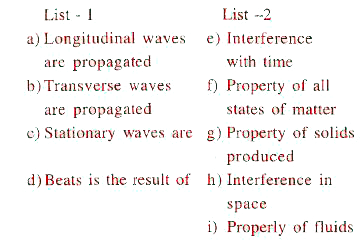(A): Sound waves cannot propagate through vaccum but light waves can
(R): Sound waves cannot be polarised but light waves can beSolution in Telugu
Both 'A' and 'R' are true and 'R' is the correct, explanation of 'A'.
Both 'A' and 'R' are true and 'R' is not the correct explanation of 'A'
A' is true and 'R' is false
Both 'A' and 'R' are false
The correct Answer is:B
Step by step video, text & image solution for (A): Sound waves cannot propagate through vaccum but light waves can (R): Sound waves cannot be polarised but light waves can be by Physics experts to help you in doubts & scoring excellent marks in Class 12 exams.
Updated on:21/07/2023Topper's Solved these Questions
- WAVESBook:AAKASH SERIESChapter:WAVESExercise:EXERCISE-II (Wave Equations & Basics :)
Explore 19 Videos
- WAVESBook:AAKASH SERIESChapter:WAVESExercise:EXERCISE-II (Strings (Speed of a travelling wave:))
Explore 23 Videos
- WAVESBook:AAKASH SERIESChapter:WAVESExercise:EXERCISE-IA (Matching )
Explore 4 Videos
- WAVE OPTICSBook:AAKASH SERIESChapter:WAVE OPTICSExercise:PROBLEMS (LEVEL - II)
Explore 20 Videos
- WAVES OPTICSBook:AAKASH SERIESChapter:WAVES OPTICSExercise:EXERCISE -III (POLARISITION)
Explore 10 Videos
Similar Questions
Which of the following expressions represents a simple harmonic progressive wave
View SolutionLength of a string tied to two rigid supports is 40 cm. Maximum wavelength in cm of a stationary wave produced on it is
View SolutionMatch the following

View SolutionIn Young's double slit experiment the y co-ordinates of central maxima and 10th maxima are 2 cm and 5 cm respectively. When the YDSE apparatus is immersed in a liquid of refractive index 1.5. Find the corresponding y co-ordinates.
View SolutionA ray of light is incident on the surface of a glass plate of refractive index √3 at the polarising angle . The angle of refraction of the ray is
View SolutionLight waves can be polarised but sound waves cannot be. Why?
View SolutionAssertion : Sound waves cannot propagate through vacuum but light waves can.
Reason: Sound waves cannot be polarised but light waves can.
View SolutionStatement 1: Sound waves can not propagate through vacuum but light waves can.
Statement 2: Sound wave can not be polarised but light waves can be.
View SolutionAssertion : Sound wave cannot propagate through vacuum but light can.
Reason : Sound wave cannot be polarised but light can.
View SolutionWhich of the following statements are correct ?
(i) Light waves can be polarised
(ii) Longitudinal waves cannot be polarised
(iii) Sound waves in gas can be polarised
(iv) Transverse waves in a string can be polarised
View SolutionAssertion : Sound wave cannot propagate through vacuum but light can.
Reasion : Sound wave cannot be polarised but light can.
View SolutionStatement -I : Sound waves cannot propagate through vecuum but ligth can .
Satement -II : Sound waves cannot be polarised but light can be polarised.
View SolutionAssertion : Sound wave cannot propagate through vacuum but light can.
Reason : Sound wave cannot be polarised but light can.
View SolutionAssertion: Light waves can be polarised but sound waves cannot be polarised.
Reason: Sound waves in air are longitudinal in nature.
View Solution(A ): The light can travel in vacuum but sound cannot do so (R) : Light is an electromagnetic wave and sound is a mechanical wave
View Solution
